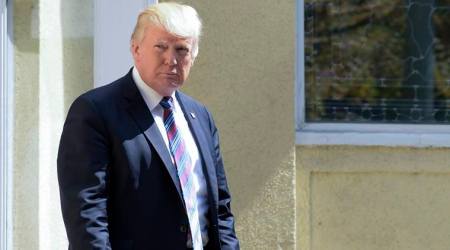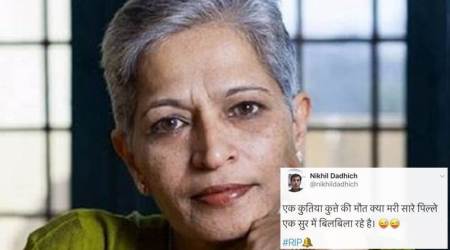 North Korean leader Kim Jong Un provides guidance on a nuclear weapons program in this undated photo released by North Korea’s Korean Central News Agency (KCNA) in Pyongyang September 3, 2017. (Photo via Reuters)
North Korean leader Kim Jong Un provides guidance on a nuclear weapons program in this undated photo released by North Korea’s Korean Central News Agency (KCNA) in Pyongyang September 3, 2017. (Photo via Reuters)
The problem of North Korea’s Kim Jong-un threatening more explosive tests is the urgent question of the day. I recognise that most Indians do not want to discuss anything else but Indian news. Yet the chance of even one-hundredth of one per cent that the world may be wiped out is worth worrying about.
Kim has shown no restraint and no fear of Donald Trump’s threats. If Kim is uncontrollable, then Trump is unpredictable. Neither is likely to behave with caution if they are aroused. Chinese President Xi Jinping is the helpless onlooker. He is supposed to be powerful enough to restrain Kim but knows that he has limited clout.
It is a stalemate but a dangerously volatile one. Any day, any moment, we could have trouble. I was a young student in the US when the Cuban missile crisis took place. The Soviet Union was trying to plant missiles in Cuba. John F Kennedy threatened on live TV that any attack from Cuba or any part of the Western Hemisphere would be regarded as being an attack by the Soviet Union, and the US will retaliate. It was Armageddon hour. There was no point in even trying to run back to India. If the whole world was going to be blown off, why bother?
That crisis did not escalate and then the nuclear threat disappeared with the Cold War. Now it has come back. Trump has not yet said what Kennedy said but there may not be even the time to make speeches if Kim and Donald fall apart.
Also read | Testing the world: Why North Korea’s ‘hydrogen bomb’ may portend a danger like no other
Like all problems which seem intractable, history is the key here. Korea had been a Japanese colony. After Japan’s defeat, Korea was divided into two in a post-war settlement, with the Soviet Union supporting Kim II-sung in the North and America supporting Syngman Rhee in the South. The Korean War erupted in June 1950 when North Korea invaded South Korea. It lasted three years and there was an Armistice negotiated.
The Korean War is officially not yet over. The partition of the country into North and South is now permanent. South Korea has prospered and become a high-income country, while North has stayed relatively poor but become a nuclear power. South is a democracy and North is a hereditary dictatorship. North passionately hates South.
What most analysts have not seen is that North Korea wants respect and recognition from the world. Its bluster arises from a sense of inferiority. The diplomatic world needs to bring a closure to the 1950-1953 war first. It needs to give the status of a recognised nation to North Korea and admit it to the UN. The border between the North and South — the 38th parallel — needs to be made internationally recognised and peaceful.
All this is doable but the countries directly involved — the US, China, the two Koreas, and Japan — have not yet met formally. Russia would be another key player. India played a part in facilitating the exchange of prisoners after the Armistice. It can thus claim a historical role as a nation friendly to all sides. This would make it possible for India to propose an international conference to bring about a closure to the old war and establish peaceable relations.
Narendra Modi should take the lead and call the conference.

